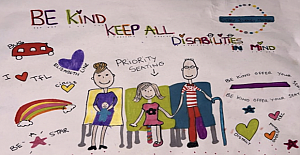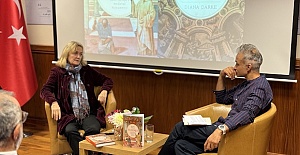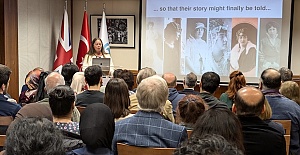A feeling of strong or constant affection for a person is described as love, but did you know that it is also a physical process in the brain triggered by a hormone called oxytocin, also known as the “love hormone”?
It wasn’t of course all hormones that made Chopin compose these gorgeous songs, or William Shakespeare write these spectacular love poems, but experts say there is a very complex interplay between our hormones and behavior.
“When someone smiles at you sincerely, your brain immediately senses the sincerity and orders your posterior pituitary gland to release oxytocin, which is a vital hormone involved in social interaction and bonding in humans,” Dr. Cagri Gulumser, an OBGYN practicing in the Turkish capital Ankara, told Anadolu Agency.
Gulumser said what people generally describe as attraction or a “positive vibe” is actually an exchange of oxytocin which makes people feel each other’s emotions such as happiness, pain, and love.
This so-called “cuddle” hormone is a protein and a nanopeptide which acts as both a hormone and also as a neurotransmitter.
Gulumser cited the hormone’s role in initiating labor in pregnant mothers.
“It’s one of the major hormones during birth. It helps the uterus contract and push the baby down when the mother is in labor,” he said.
Secure attachment
Dr. Ozlem Gulumser, a pediatrician, stressed oxytocin’s significance in the process of lactation and breast feeding, saying that it also acts as a hormone bonding mothers and their babies.
“When a baby sucks on his or her mother's breast, the nipple is stimulated, which causes the release of oxytocin and then the milk for the baby to drink,” said Gulumser, who is also married to the OBGYN.
Pointing to the difference between the level of oxytocin of women who gave birth vaginally versus those who had caesareans, Ozlem Gulumser said bonding with the baby takes longer for a mother who had a caesarean.
Cagri Gulumser said it always takes a longer time for fathers to build a bond with their children, as the level of oxytocin rises the more they physically interact with their children.
“After labor starts and the mother begins getting angry with the medical team in the room, I get happy,” said Cagri Gulumser
“Because that’s when I know that her level of oxytocin is rising, which also means that there will be less bleeding. She intrinsically tries to protect her baby.”
Secure attachment between a mother and baby is crucial, Ozlem Gulumser said, adding that it influences the child’s relationships throughout his or her life.
Trust builder
As important as mother-infant bonding is, in fact oxytocin’s role in our lives is far greater, as it affects all kinds of social relationships.
In an interview with the Australian Broadcasting Corporation (ABC), Larry Young, professor in the neurobiology of social behavior at Emory University in Atlanta, recalled an experiment on rodents called prairie voles “which are unusual in the sense that they are monogamous.”
During the experiment, the rodents given oxytocin were observed to have formed a kind of addiction to their partner.
“Following up on our work in animals, people began to ask, what happens if you give oxytocin to people? And the initial studies found that it made people look into the eyes, into the faces of other people more. It drew their attention to the social cues. It also helped them read the emotions of others,” he explained.
“There's even data suggesting that oxytocin acts in the same brain areas as in our little voles to make our partners be more attractive to us. It's not just involved in bonding but is really in attuning to the social world around us.”
Moreover, oxytocin boosts trust in humans according to a 2005 study by Michael Kosfeld, Urs Fischbacher, Ernst Fehr and Markus Heinrichs from the University of Zurich and Paul J. Zak from California’s Claremont Graduate University.
“Oxytocin might render subjects more optimistic about the likelihood of a good outcome,” they wrote.


 After Nesil Caliskan a by-election will be held in Jubilee ward in Enfield
After Nesil Caliskan a by-election will be held in Jubilee ward in Enfield Publishing the analysis, Labour’s Cllr Ergin Erbil said Everybody in Enfield deserves basic rights
Publishing the analysis, Labour’s Cllr Ergin Erbil said Everybody in Enfield deserves basic rights Gaza-Israel conflict Statement from Cllr Ergin Erbil, Leader of Enfield Council
Gaza-Israel conflict Statement from Cllr Ergin Erbil, Leader of Enfield Council Cllr Ergin Erbil was elected as the new Leader of Enfield Council
Cllr Ergin Erbil was elected as the new Leader of Enfield Council London aging faster than any other UK city, study reveals
London aging faster than any other UK city, study reveals Cold weather health alerts issued ahead of snow
Cold weather health alerts issued ahead of snow London defies weather with spectacular fireworks display to ring in 2025
London defies weather with spectacular fireworks display to ring in 2025 Alim Karaca, who hosted Bill Gates, Jeff Bezos, Trump, talked about Fethiye
Alim Karaca, who hosted Bill Gates, Jeff Bezos, Trump, talked about Fethiye Footballers are celebrating after Enfield Council officially opened a pitch
Footballers are celebrating after Enfield Council officially opened a pitch  Pep Guardiola's Manchester City beaten by Juventus
Pep Guardiola's Manchester City beaten by Juventus Chelsea to meet Arsenal in Sunday's London derby
Chelsea to meet Arsenal in Sunday's London derby Fenerbahce vs Manchester United Predicted line-ups! Jose Mourinho faces former side
Fenerbahce vs Manchester United Predicted line-ups! Jose Mourinho faces former side The transformational Elizabeth line reaches 500 million passenger journeys
The transformational Elizabeth line reaches 500 million passenger journeys HMRC DELAYS AGENT SERVICES ACCOUNT APPROVALS
HMRC DELAYS AGENT SERVICES ACCOUNT APPROVALS UK economy had zero growth between July and September
UK economy had zero growth between July and September Shape the future of housing services with The Enfield 500
Shape the future of housing services with The Enfield 500


















